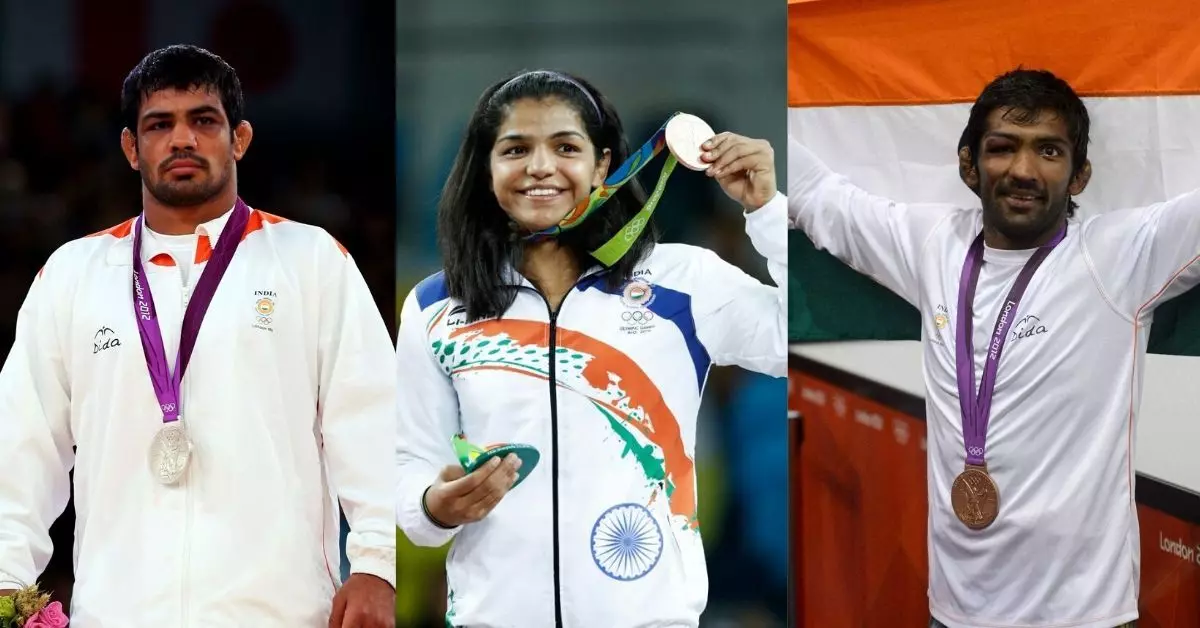Wrestling
Tokyo Olympics — What is repechage rule in wrestling? How does it work?
Tokyo Olympics: Repechage in Wrestling Explained, Rules and Indian Medallists benefitting from the rounds.

Sushil Kumar, Sakshi Malik and Yogeshwar Dutt won the Bronze Medals in Olympic wrestling with the repechage round.
The repechage rounds in wrestling have brought in three medals in the Olympics for India. The repechage round derives its meaning from the term 'repecher' in French, which literally means rescue. Repechage rounds are present in several sports events like wrestling, baseball, softball, beach volleyball, cycling, fencing, rowing, rugby, sailing, track and field athletics, taekwondo and karate.
How does repechage work in wrestling?
The International Olympic Committee (IOC) introduced the repechage rounds in the Beijing Olympics 2008. The Beijing Olympics was the first major event to feature the repechage rounds.
The repechage round allowed the wrestler to have a shot at a third-place/bronze medal finish in freestyle and Greco-Roman wrestling events included in the Olympics, despite losing in the knockouts. The wrestlers who lost a bout to the eventual finalists in each category in the semi-finals or earlier are allowed another chance to win the bronze medal.
Suppose if two wrestlers - X and Y, lose to wrestler A in the knockout rounds and then wrestler A reaches the final, then wrestler X and Y will face-off against each other for a bronze medal in Repechage.
A final obviously occurs between two wrestlers, for example A and B. Now, the two wrestlers who lost to wrestler B in the knockout rounds also face off each other for a bronze medal in Repechage rounds. In simple terms, if wrestler M and N had lost to wrestler B in knockout rounds they will face each other in repechage.
Thus, wrestling awards two bronze medals at the Olympics - one for the winner of Repechage between X and Y and one to the winner of Repechage between M and N.
The argument behind the second chance for the losing wrestlers is that it has been deemed unfair that a promising wrestler faces an early exit in the tournament because of facing a stronger wrestler early in the tournament.
How did repechage help Indian wrestlers?
Sushil Kumar, Yogeshwar Dutt and Sakshi Malik have bagged Bronze medals in the Olympics with the repechage round coming to their rescue. Kumar finished third in the 66kg category at the Beijing 2008 Olympics.
Dutt clinched bronze in the 60kg category at the London 2012 Olympics while Malik became the first ever female wrestler from India to bag an Olympic medal as she won bronze in the 58kg category at the Rio 2016 Olympics.
Kumar lost to eventual silver medallist Ukraine's Andriy Stadnik in Round 16, thus making it to the repechage. The London 2012 Olympic silver medallist registered wins over Doug Schwab (USA) and Albert Batyrov (Belarus) before upstaging Leonid Spiridonov (Kyrgzyzstan) in the repechage final.
Dutt lost to Besik Kudukhov (Russia) in Round 16 and entered the repechage after the Russian made it to the final. He overcame the challenges from Franklin Gomez (Puerto Rico) and Masoud Esmaeilpour (Iran) in the first two repechage rounds before emerging victorious over Ri Jong-Myong (North Korea) in the repechage final.
Mallick succumbed to a loss to Valeria Koblova (Russia) in the quarter-finals before entering the repechage. Mallick outscored Pürevdorjiin Orkhon (Myanmar) and Aisuluu Tynybekova (Kyrgyztsan) to win the historic Bronze medal in the Rio 2016 Olympics.
